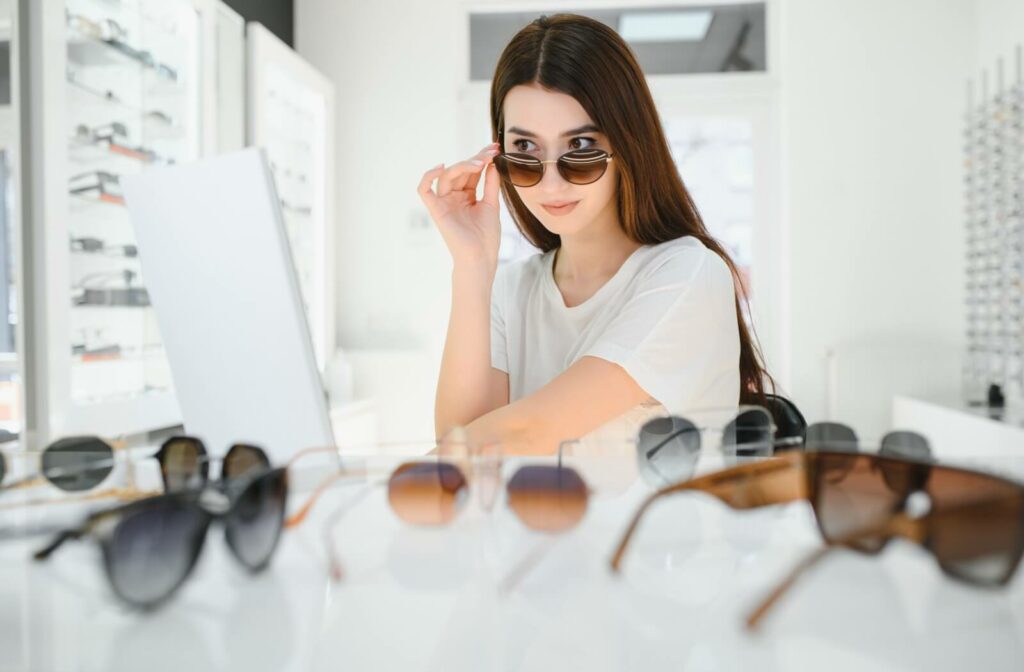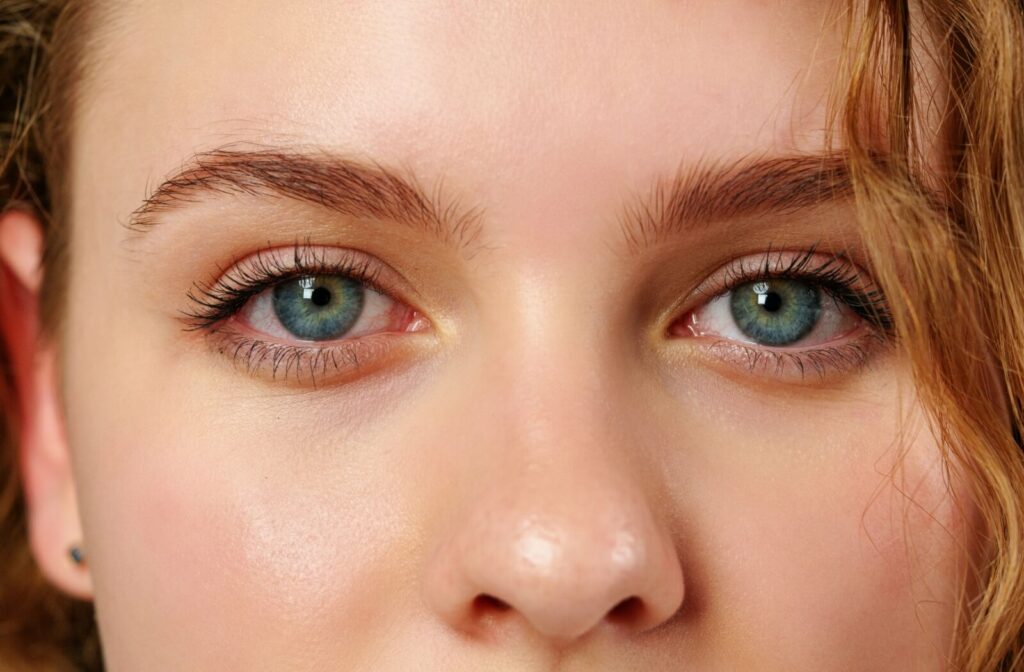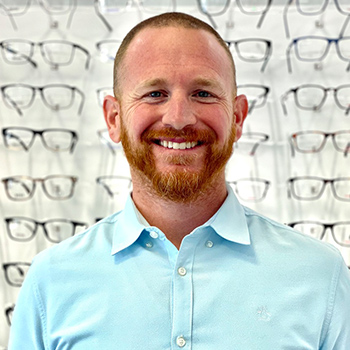Celebrating the diversity in our features should be appreciated! Not only do these features make us who we are, but they serve a purpose and function in how we interact with our daily environment.
The color of our eyes can vary, and our eye color might even change as we grow. Melanin is the pigment in our bodies responsible for the color of our eyes, hair, and skin. It also provides a natural protection against sunlight.
Blue eyes have lower levels of melanin and are more sensitive to sunlight than darker eyes. However, everyone is at risk for developing sun damage without adequate sun protection, regardless of their eye color.
Why Are My Eyes Sensitive?
Sunlight plays an important role in our overall health and well-being. It’s a vital source of energy and vitamin D. However, despite its benefits, we should protect our eyes and skin from the harmful UV rays in sunlight.
Melanin is a pigment found throughout our bodies and is responsible for the color of our eyes, hair, and skin.
The color of our iris depends on the amount of melanin in our bodies. The iris is the structure in our eye that surrounds the pupil and controls how much light enters the eye, and light-colored irises have slightly less natural protection against sunlight than brown and dark-brown eyes.
Blue eyes have little to no melanin, which means more light can penetrate the iris and reach the retina, making blue eyes more susceptible to glare and bright light.
Melanin also plays an important role in protecting our eyes from harmful UV rays. Those who have blue eyes also have less natural protection against sunlight. As a result, they may experience greater sensitivity and discomfort when exposed to bright conditions.
Experiencing some sensitivity to light is normal. But the level at which we experience this sensitivity varies based on multiple factors, including the amount of pigment in our eyes. However, increased light sensitivity, or photophobia, is often associated with other eye concerns or medical conditions.
Without adequate eye protection from the sun, our eyes are prone to UV damage and can lead to various eye conditions.
Our Eyes & Sun Damage
Although individuals with blue eyes are more prone to light sensitivity than those with brown eyes, protecting our eyes from sun damage is necessary for everyone, regardless of eye color. People with darker eyes have more melanin and thus better natural protection from sunlight, but they’re not immune to the harmful effects of UV rays.
Just as our skin can suffer from sunburn and damage caused by UV exposure, our eyes can also experience damage from prolonged exposure to sunlight. Exposure to UV rays can lead to the development of several eye conditions which can cause lasting damage.
Types of UV Rays
Two types of UV rays affect the eye: UVA and UVB rays.
UVA rays can deeply penetrate the eye and harm the macula, a structure in the retina that’s responsible for central vision. On the other hand, UVB rays primarily impact the lens or corneal tissue at the front of the eye. Such damage can result in conditions like photokeratitis, which is essentially a sunburn of the eye.
Sun-related eye damage typically happens slowly over time, often without noticeable symptoms. Routine eye examinations can help identify any damage, making them a necessary component in monitoring your ocular health.
Symptoms of Photokeratitis
Symptoms of sun damage include:
- Blurry vision
- Difficulty focusing
- Headaches
- A spot in your central vision
Visit your optometrist as soon as possible if you begin to experience any of these symptoms. Sun damage to our eyes can have lasting effects if left unattended. In some cases, sun damage to the eyes can be reversed, but this depends on the extent and the type of damage incurred. Early detection and prevention can help preserve ocular health and maintain clear vision.
Other Eye Concerns Caused by Sun Damage
Sun damage can increase one’s risk of developing serious eye conditions, including:
- Age-related Macular Degeneration (AMD)
- Cataracts
- Eyelid Cancer
- Growths on the Eye

Protect Your Eyes from Sun Damage
While some sun damage can be reversed, we should take necessary precautions to prevent this damage from occurring in the first place. When you’re exposed to the sun, use sunglasses that block UV rays.
One of the most popular and effective ways we can protect our eyes from sun damage is by wearing sunglasses. A good pair of sunglasses not only enhances comfort on sunny days but also acts as a barrier against UV rays.
Polarized Sunglasses
Polarized glasses reduce glare and enhance our vision while doing outdoor activities like hiking, fishing, or skiing. These lenses can even improve color perception by enhancing color contrast, but polarized lenses alone don’t provide UV protection.
Non-Polarized Sunglasses
Non-polarized lenses can reduce overall brightness and promote visual comfort, especially in harsh lighting conditions. While they don’t reduce glare as well as polarized sunglasses do, these lenses are a good choice for everyday wear, especially for people who look at LCD screens like computers or car dashboard displays.
How UV Protection Works
Whether you choose polarized or non-polarized lenses, make sure your pair sufficiently protects you from UV rays.
Wearing a pair of dark-coated lenses won’t necessarily provide adequate protection from sunlight. When shopping for sunglasses, look for labels or tags indicating “100% UV protection” or “UV400,” which means the lenses block all UVA and UVB rays.
UV protection works to keep the eyes safe from sun damage by providing a barrier against harmful ultraviolet radiation.
UV-protective eyewear, such as sunglasses, can work one of two ways:
- Absorbing UV rays before reaching the eyes
- Reflecting UV rays away from the eyes
This is achieved through a special coating applied to the lenses, to block UVA and UVB rays, protecting our eyes from sun damage while simultaneously diminishing discomfort from harsh lighting conditions.
Eye Exams to Support Your Eye Health
While individuals with blue eyes are more sensitive to light than those with dark eyes, we are all susceptible to sun damage. Wearing protective eyewear and visiting your optometrist for routine eye exams are crucial in maintaining and preserving your ocular health.
Connect with our team at Dr. Bittel Optometry to schedule an appointment for your routine eye exam or to browse our selection of sunglasses.


